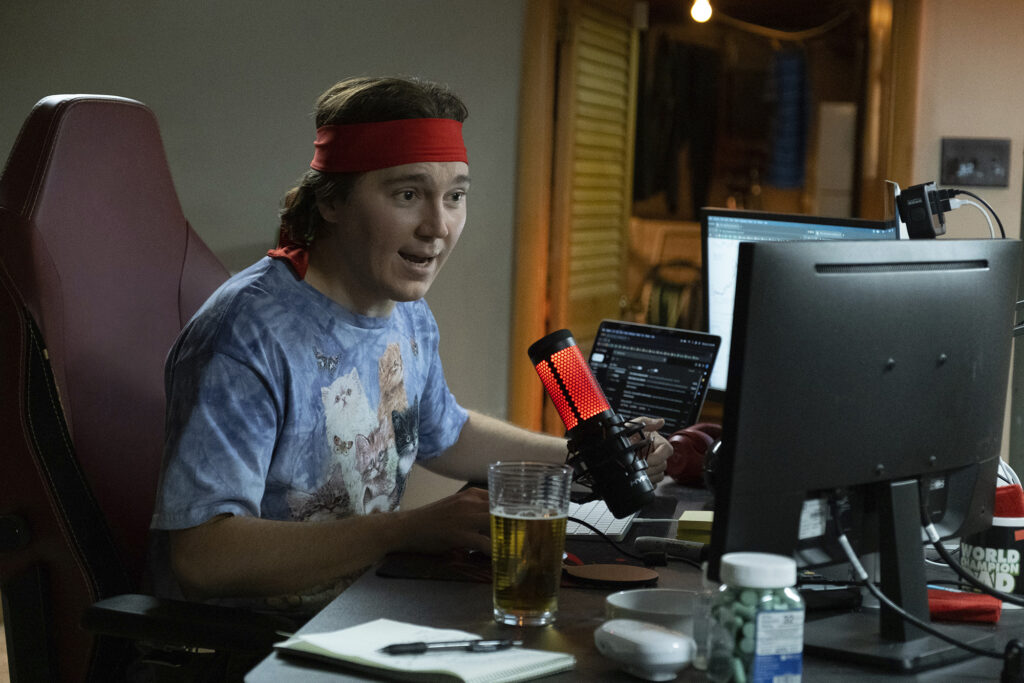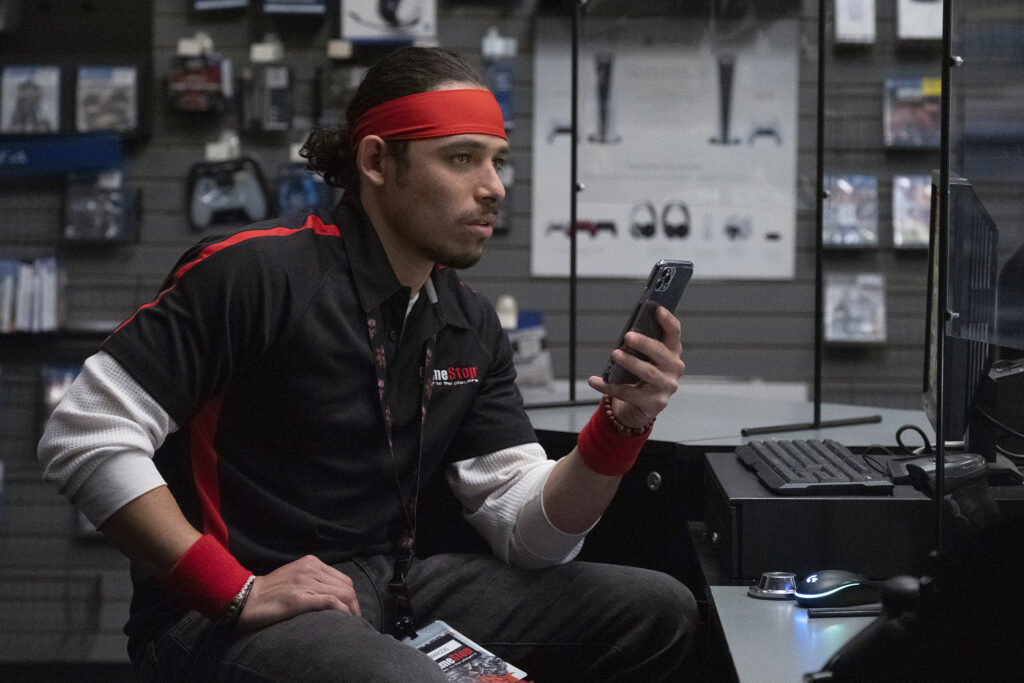‘Dumb Money’ Director Craig Gillespie Talks True Stories & Rigged Systems
“Like all good things, Dumb Money started in Canada,” an exuberant Aaron Rogers announced to a packed crowd at Roy Thompson Hall earlier this month. We’d just watched the premiere of Dumb Money — the latest from director Craig Gillespie, whose resume includes several based-on-a-true-story dramas, including 2014’s Million Dollar Arm and 2018’s I, Tonya — and he was kicking off the brief post-premiere discussion. Amidst the dual WGA and SAG-AFTRA strikes, writers and actors were largely absent from the 2023 Toronto International Film Festival (TIFF). But, after seeing Gillespie’s film, their pro-worker message felt more relevant than ever.
The feature follows 2021’s ‘short-squeeze’ on GameStop stock. Led by Keith Gill (Paul Dano), also known as ‘roaringkitty’ on the r/WallStreetBets subreddit, the movement saw shares skyrocket in value, a testament to the power of retail investors — known in Wall Street circles as ‘dumb money’ — over stock value. Following an ensemble cast, the film uses composite characters to portray the many individuals involved in the true-life tale, including single parents, college students, and retail workers. It’s an inspiring retelling, to be sure, although it finishes on a note that’s equal parts empowering and frustrating. Speaking with the director himself, SHARP learned how the story went from the finance section to the TIFF marquee.



When asked about cinematic adaptations of real-life business and finance-related narratives, Gillespie admits he hasn’t given the genre’s rising popularity much thought: “I always just get attracted to the material; I never know how that’s going to transpire, or where it’s going to come from,” he says. “I would guess though, as you asked that question: truth is often stranger than fiction. It creates these extraordinary circumstances in real life. I think for actors, [that’s] an amazing opportunity to dive into: telling stories of incredibly intense or heightened experiences that happen to real people.”
He’s right: the talented cast electrifies the subject matter, bringing the headlines to life and imbuing the whole thing with an air of real-world authenticity. Seth Rogen paces anxiously across his sprawling, ultra-modern Miami home as the smarmy Gabe Plotkin, while Paul Dano’s Keith Gill blows off steam at a dreary running track in suburban Massachusetts.
“There’s very specific talent in this film. I love to do this dance between humour and drama, so I need to find actors that can do that; it’s got to be in their DNA.”
Craig Gillespie
The production team complements the actors’ craft with true-to-life fixtures — Keith Gill celebrates an early win with chicken nuggets, his younger brother Kevin Gill (Pete Davidson) pulls on a cheap smoke while he delivers food in Dorchester. In one scene, Gill livestreams his short-squeeze scheme to a couple hundred viewers while the camera pans to disparaging comments from his fellow Redditors. They’re reproductions of actual comments on Gill’s livestreams — down to the capitalization.
“I would credit Scott Kuzio, our production designer there,” Gillespie says of the imagery, “but it’s all about being authentic as much as possible. This movie was shot in real locations, which I love because you’re immediately starting with something that feels more authentic.” He’s not wrong: there’s a feeling of rawness to the set that is a breath of fresh air against the high-gloss, sophisticated setting of many Hollywood hits. Grimy white walls frame mid-COVID frat parties at the University of Texas, while empty storefronts recall the uncanny, shuttered feeling of all-but-abandoned shopping malls.

“When you have a great set decorator, great production designer, it becomes so complex and lived in — the amount of homework they do, even stepping into the dorm rooms [for the] college girls — they make it look like a fully formed life,” he adds.
There’s certainly truth to this, but he’s being humble: Dumb Money achieves its delicate, often elusive balance of journalistic reporting and cinematic drama thanks to Gillespie’s deft direction. Producing creative nonfiction is like walking a tightrope: veer too far into the numbers and news reports, and they drama may well dry up; take too much creative liberty, and viewers will haul you over the coals for it.
With that, we ask Gillespie how he tells the compelling, cinematic story of Dumb Money while still retaining a respect for the real people involved. “I had the most respect for the journey they went on, and the stakes that were involved,” Gillespie starts, “You get to see so much of who Keith is as a person from his post — he was posting 7 hours a week for a year, and it’s all up there. It’s all stuff that Paul researched, to the point that the t-shirts Paul is wearing are the actual t-shirts that [Keith wore]. We tried to be as loyal as possible. And even the dialogue, the opening post [Keith] does where he’s like, ‘what’s up, everybody?’ That’s the actual verbatim,” he says, adding, “so I’d say, you know, when you have all this real life to pull from, it’s a North Star.”

If the headlines of 2021 are a North Star, then Gillespie’s personal experiences are a flashlight; local details ground the plot in an authentic setting. “I’m from Australia — it’s very different, you know, [from] America. There’s not that small town aspect in Australia like there is in the States,” he concedes, “but my wife is from outside of Philly, and I got to see that world for the last 35 years. That’s a huge touchstone for me, seeing how everybody interacts — I was blessed to have that opportunity.” Gillespie’s connection to rural America lends truth to the film’s settings, showing pandemic hospitals, beat-up Toyotas, and desolate gas stations, in all their everyday, ‘real-world’ charm.
This theme carries into the roles: each character acts like a mouthpiece for a different subcategory of r/WallStreetBets. “America Ferrera’s character, for instance, is largely based on Harmony, who is a real person that Ben met with,” Gillespie says. (‘Ben’ is Ben Mezrich, the author of 2021’s The Antisocial Network, which chronicled the GameStop short squeeze and served as the basis for Dumb Money.)
“It’s not just about the stock market — like, this story was, to me, much larger than that. It was [about] the disparity of wealth and the frustration going on in the country. This was one way to vent that. It’s happening now, with the strikes, you know? It’s been happening everywhere.”
Craig Gillespie
“But there’s 8 million people that were involved in the WallStreetBets movement when it was happening,” the director elaborated, “So, we did more composites to capture each each unique group. There were [characters] like America’s, that were very much about the frustration over the disparity of wealth and wanting to be heard by big business, by the government, and wanting to just have a voice. Then, there were other people that were just in it for the money.”
Asked how he settled on the film’s star power, Gillespie refers to casting America Ferrera — a humorous and heartfelt highlight — as a no-brainer. “There’s very specific talent in this film. I love to do this dance between humour and drama, so I need to find actors that can do that; it’s got to be in their DNA,” he explains. “It’s a very tricky thing, to keep the audience engaged emotionally, [while] allowing them space — and America has that, you know? That’s primarily what I’m looking for.”

Dumb Money has no shortage of comedy — Pete Davidson made the whole theatre roar on more than one occasion — but these laughs are balanced by a range of raw emotions: heart-racing anxieties, frustrated ranting, and genuine, heartfelt connection. “There’s a lot of frustration going on,” Gillespie agrees, “you want somebody that you actually want to hear do that, and do it with an intelligence, you know? Which, again, you see so much in [America’s] work. But then she’s got this deft hand with humour, and she can just […] keep you on track with the story. So she was a no brainer for me.”
Gillespie seems to share a level of comradery with the cast — of Seth Rogen, he speaks with a similar fondness, “I always find it interesting to be able to like cast against type — like, here he is playing, quote-unquote ‘the villain’ in the film. There’s not a lot of humour in in his performance… the stakes are very real and very dire for him. And to see him almost be the straight guy in this is really enjoyable.”
“I want you to walk out of the theatre and have this sense of outrage and anger about what happened, and hopefully it fuels that dialogue. It’s not over.”
Craig Gillespie
This duality — in Rogen’s instance being vulnerable, yet villainous — is trademark of Gillepse’s work. In Dumb Money, a ridiculous situation inspires simultaneous comedy, frustration, and terror. The characters are composites, but they are far from caricatures: Seth Rogen captures a slapstick humour as he runs across his villa in a panic (on more than one occasion), but he also plays very raw, honest anxiety as he faces financial peril. And, thanks to Gillespie’s penchant for authenticity, these extremes don’t feel contradictory; rather, they show a nuanced character.
In that vein, the context of the film — its meta-narrative, if you will — grapples with a similar question. After all, isn’t it dizzying to premiere a ‘power-to-the-people’ film during a historic Hollywood strike? Yet, Gillespie doesn’t stray from the irony: for the director, it’s perfect timing.



Expanding on Dumb Money‘s central theme, he explains, “It’s not just about the stock market — like, this story was, to me, much larger than that. It was [about] the disparity of wealth and the frustration going on in the country. This was one way to vent that. It’s happening now, with the strikes, you know? It’s been happening everywhere.”
Dumb Money has an inherent outside-the-theatre-relevance — being based on a true story — but still, it hammers its point home. Before the credits roll, a blow-by-blow summary of the trial involving Gill, Robinhood, and Citadel flashes onscreen. The big reveal shows (among other things) that the GameStop stock has fallen again, and that Citadel and Robinhood were cleared.
“In our house, there was this unbelievable sense of frustration and anger about what transpired, and this real sense that the system’s rigged, and there is no accountability.”
Craig Gillespie
But, before the theatre resigns itself to existential dread, Gillespie asks that we pause for a second: “I want you to walk out of the theatre and have this sense of outrage and anger about what happened, and hopefully it fuels that dialogue. It’s not over,” he says.
He doesn’t say this lightly — for Gillespie, the disillusion was personal, “In our house, there was this unbelievable sense of frustration and anger about what transpired, and this real sense that the system’s rigged, and there is no accountability. I sort of wanted to fan that flame again,” he explains.

With plenty of pandemic-era references (who doesn’t remember the Savage dance?), the film reminds viewers of just how many stories get buried in the landfill of a 24-hour news cycle. Part of ‘fanning the flame’ is just remembering the realities, good and bad. “I think on the plus side, it’s definitely changed things,” Gillespie notes, “there’s this one line, that’s from an actual reporter, at the end of the movie. It [says] Reddit users were considered this fringe group, and now they actually have the power to move — 85% of hedge funds are monitoring social platforms because of it. So, you know, it’s a very real phenomenon. They saved AMC 4 weeks later.”
The sum of all these parts — the authentic settings, the often-flawed characters, the mixed-bag resolution, the shared goals, and unshared values — holds up a mirror to the headlines. Dumb Money shows its characters up close, imperfections writ large in high definition, as they work towards a common goal. And, whether or not they succeed is irrelevant; what matters is that they made something happen. As Gillespie put it, “‘You’re important’ is the plus side to it.”
Dumb Money is in select theatres now, with a nationwide release on the 29th.
Feature photo courtesy of TIFF.










